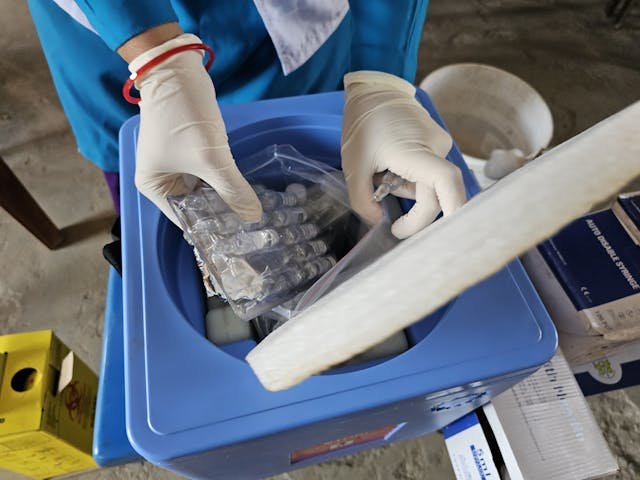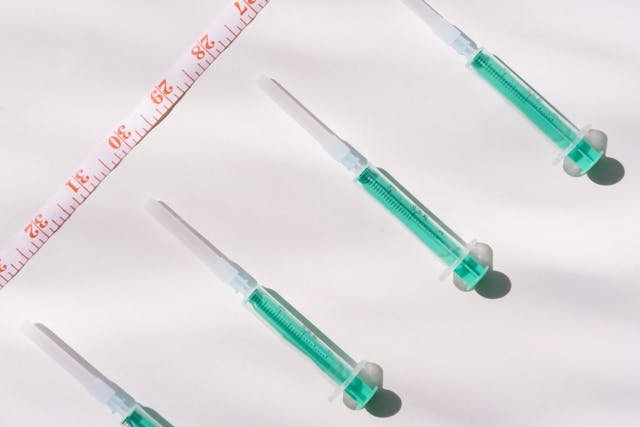Imagine You’re staring at that little vial of semaglutide in your fridge, squinting at the tiny expiration date that looks like it was printed by ants and ask yourself a question, does semaglutide expire? Sounds familiar.right? If you’ve ever found yourself playing detective with your medication dates, you’re definitely not alone.
Here’s the thing – yes, semaglutide does expire, and it’s not just some arbitrary number slapped on there by overly cautious pharmaceutical companies. That little date actually matters more than you might think, especially when we’re talking about a medication that’s helping you manage your weight or diabetes.
I get it. You’ve invested in this treatment, both financially and emotionally. The last thing you want is to toss it in the trash because of some numbers on a label. But before you channel your inner rebel and ignore those dates, let’s dive into what really happens when semaglutide expires and why playing it safe might be your smartest move.
Does Semaglutide Expire After 28 Days?
Short answer? Absolutely. But here’s where it gets interesting – semaglutide doesn’t just magically transform into a pumpkin at midnight on its expiration date.
Think of medication expiration like that carton of milk in your fridge. The date gives you a pretty good idea of when things might start going downhill, but it’s not an instant switch from “perfectly fine” to “absolutely terrible.” However, unlike that questionable milk you might risk in your coffee, we’re talking about something you’re injecting into your body.
Semaglutide typically comes with these shelf lives:
- Unopened vials: Usually 24 months when stored properly
- Opened vials: Generally 56 days (about 8 weeks) in the refrigerator
- Compounded versions: May vary depending on the pharmacy
The expiration date represents the point where the manufacturer can no longer guarantee the medication’s potency and safety. After this date, the active ingredients start breaking down, and you might not get the full therapeutic effect you’re paying for.

What if i Accidentally Took Expired Semaglutide?
Let’s get real for a moment. Using expired semaglutide isn’t like accidentally eating expired yogurt – the consequences can be more serious and definitely less predictable.
When semaglutide passes its expiration date, several things can happen:
Reduced Effectiveness: The medication starts losing its punch. You might not see the same appetite suppression or blood sugar control you’re used to. It’s like trying to charge your phone with a dying battery pack – technically it’s working, but not nearly as well as it should.
Unpredictable Side Effects: Here’s where things get dicey. Expired medications can sometimes cause unexpected reactions, and with semaglutide, this could mean anything from increased nausea to more serious complications.
Contamination Risks: Over time, the sterile environment inside that vial can become compromised. Bacteria love expired medications almost as much as they love your leftover pizza.
Chemical Changes: The molecular structure of semaglutide can actually change over time, potentially creating compounds that weren’t there originally. Not exactly what you signed up for, right?
I once heard from someone who used expired semaglutide for weeks thinking it was fine because they “felt okay.” The reality? They weren’t getting any of the benefits they were paying for and potentially putting themselves at risk. Don’t be that person.
How to Properly Store Semaglutide
Storage isn’t just about tossing your medication in the fridge and hoping for the best. Proper semaglutide storage can actually extend its effectiveness right up to that expiration date.
Temperature Control:
- Keep unopened vials refrigerated between 36-46°F (2-8°C)
- Never freeze – frozen semaglutide is ruined semaglutide
- Room temperature is okay for short periods, but don’t make it a habit
Light Protection: Store in original packaging to protect from light. That fancy UV protection isn’t just for show – light can break down the medication faster than a celebrity marriage.
Proper Handling:
- Don’t shake the vial like a polaroid picture
- Keep it upright when possible
- Avoid temperature swings (no leaving it in your car during summer)
| Storage Location | Temperature | Duration | Notes |
|---|---|---|---|
| Refrigerator | 36-46°F | Until expiration | Best option |
| Room Temperature | Up to 86°F | Max 56 days | Emergency only |
| Freezer | Below 32°F | Never | Destroys medication |
Side Effects Of Using Expired Semaglutide
Sometimes you don’t need to wait for an expiration date to know something’s off. Your semaglutide will usually tell you when it’s time to say goodbye.
Visual Red Flags:
- Cloudiness in the solution (it should be crystal clear)
- Particles floating around like a snow globe
- Color changes – any tint that wasn’t there before
- Crystallization or clumping
Physical Changes:
- Thickened consistency
- Unusual odors (though semaglutide is typically odorless)
- Damage to the vial or rubber stopper
Performance Issues:
- Sudden increase in side effects
- Loss of appetite suppression
- Blood sugar control becomes erratic
If you notice any of these signs, don’t play Russian roulette with your health. Toss it and get a fresh supply.
Safety Guidelines for Expired Medications
Here’s where I put on my serious hat for a minute. The general rule with expired medications, especially injectables like semaglutide, is simple: don’t use them.
The FDA’s Position: The FDA doesn’t mess around when it comes to expired medications. Their official stance is that you shouldn’t use any medication past its expiration date, period. And honestly, when it comes to something you’re injecting into your body, this isn’t the time to be a rebel.
Special Considerations for Semaglutide:
- It’s a protein-based medication, making it more susceptible to degradation
- Injectable medications have stricter safety requirements
- The cost of replacement is worth the peace of mind
What to Do Instead:
- Contact your healthcare provider if you’re running low
- Check with your pharmacy about automatic refills
- Set calendar reminders for refill dates
- Consider prescription insurance to reduce costs
Disposal Guidelines: Don’t just throw expired semaglutide in the trash. Many pharmacies have take-back programs, or you can mix it with cat litter (seriously) and then dispose of it safely.

Can You Use Expired Semaglutide? The Bottom Line
I know you’re hoping I’ll give you permission to use that expired vial sitting in your fridge, but I’m going to be the friend who tells you what you need to hear, not what you want to hear.
The honest answer is no, you shouldn’t use expired semaglutide. I get it – this stuff isn’t cheap, and throwing away medication feels wasteful. But think of it this way: would you rather waste some money or waste your health?
Consider the math: if your expired semaglutide has lost even 20% of its potency, you’re essentially paying full price for 80% of the benefits. Add in the potential risks, and it’s just not worth it.
Better Alternatives:
- Talk to your doctor about patient assistance programs
- Check if generic versions are available
- Look into compounded semaglutide options
- Explore manufacturer coupons and discounts
Proper storage protects your medication investment and ensures consistent results throughout treatment. Most people using GLP-1 medications don’t realize that storage, dosing timing, and injection technique all significantly impact effectiveness beyond just taking the medication regularly.
Your Next Steps
Look, managing your health shouldn’t feel like solving a puzzle with half the pieces missing. When it comes to semaglutide expiration, the safest path is also the simplest one: respect those dates.
Set yourself up for success by creating a medication management system that works for you. Use your phone’s calendar, get automatic refills, or whatever it takes to avoid finding yourself with expired medication in the first place.
Remember, your health journey is a marathon, not a sprint. Don’t let expired medication become the pothole that derails your progress.
Ready to take control of your medication management? Talk to your healthcare provider about setting up a refill schedule that keeps you safely stocked with fresh, effective semaglutide. Your future self will thank you for making the smart choice today.
Always consult with your healthcare provider before making any decisions about medication use or storage. This information is for educational purposes and should not replace professional medical advice.







